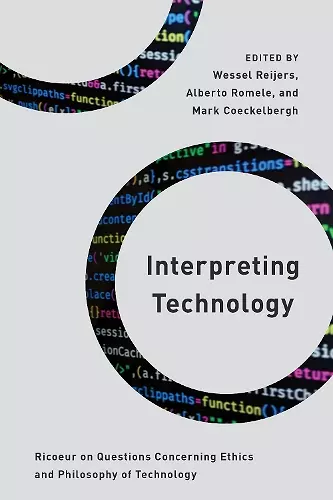Interpreting Technology
Ricoeur on Questions Concerning Ethics and Philosophy of Technology
Wessel Reijers editor Alberto Romele editor Mark Coeckelbergh editor
Format:Paperback
Publisher:Bloomsbury Publishing PLC
Published:15th Mar '23
Currently unavailable, and unfortunately no date known when it will be back
This paperback is available in another edition too:
- Hardback£120.00(9781538153468)

This book explores Paul Ricœur's philosophical insights into technology, emphasizing the ethical and political dimensions of our modern technological landscape.
In Interpreting Technology, the philosophical contributions of Paul Ricœur are examined in relation to contemporary technological discourse. This work delves into Ricœur's critical hermeneutics, a framework that re-evaluates established theories of technology. It explores how technologies increasingly influence our ethical and political landscapes, particularly within the context of the modern lifeworld. The book investigates the implications of sociotechnical systems, such as the Internet, and how they shape our interactions and identities.
Ricœur, recognized as a significant philosophical figure of the last century, has had a profound impact across various fields, including language, history, ethics, and politics. However, his influence on the philosophy of technology has been relatively limited until now. Interpreting Technology seeks to reposition his ideas at the forefront of this vital discourse, addressing crucial questions about the intersection of narrative theory and technological mediation. The text encourages readers to consider how ethical considerations can inform our technical practices, aiming for a good life within just institutions.
The relevance of these discussions is heightened in the 21st century, as technologies play an increasingly central role in our lives. From health applications that influence personal well-being to social media reshaping our connections, and digital platforms affecting our political engagement, Interpreting Technology provides a timely exploration of how we navigate these complex relationships in a rapidly evolving world.
This ambitious volume exploits Ricouer’s hermeneutics to develop essential guidance to our interpreting multiple dimensions of our lives and concerns vis-à-vis technology broadly and specific technologies such as AI and social media. Going well beyond central schools in contemporary philosophy of technology, such as postphenomenology and the Frankfurt School, it thereby enables us to better respond to these concerns in more ethical and genuinely emancipatory directions. Individual chapters, encapsulated by the editors’ overarching insights, offer a rich tapestry of critique, insight, and foundations for most promising new directions in philosophy of technology. -- Charles M. Ess, professor emeritus, University of Oslo
ISBN: 9781538153482
Dimensions: 227mm x 151mm x 18mm
Weight: 431g
320 pages